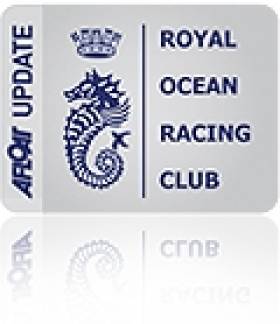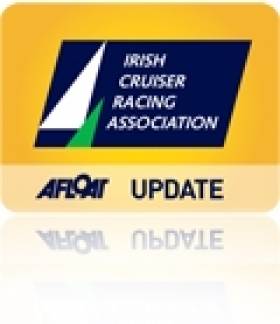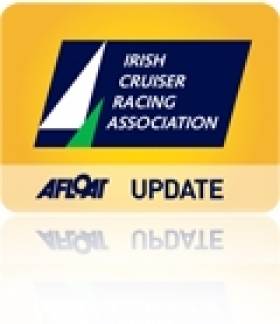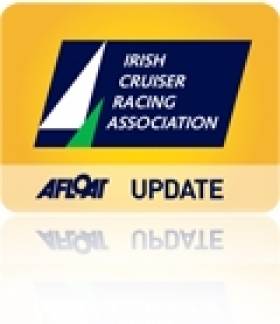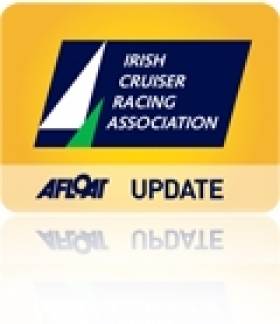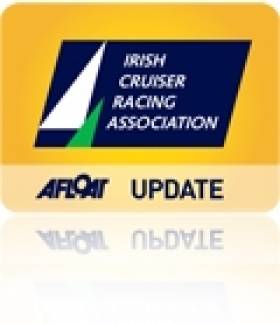Displaying items by tag: ICRA
Royal Cork's Jamie McWilliam Heads up Team Hong Kong
Having finished fifth overall in 2008, surprising many of the more seasoned campaigners in the process, McWilliam and his teammates were resolute in their determination to return.
With three months to go to the 10th edition of the biennial Rolex Commodores' Cup, the international fleet has every prospect of being one of the more exotic in recent events. A noteworthy success in these straightened times.
The Hong Kong team is made up of Rockall III, a Corby 36 owned by Chris Opielok, in the small boat slot. 'Opie', as he is known, is a Hong Kong sailing legend, having won two Admiral's Cups for his native Germany. Rockall III is the former Rosie, which has a dominant history in UK & Irish IRC racing. The middle boat is Blondie IV, a Mills (King) 40 chartered by Anthony Day from Helmuth Hennig, both very well known Hong Kong racers. Blondie was 2nd in class in Rolex Commodores' Cup 2008 and has an exceptional track record under her former owner. The big boat is Mandrake, Nick Burns' Mills 40.5, formerly Ngoni and Tiamat. AsTiamat, she had an outstanding Rolex Commodores' Cup in 2006.
The headline foreign contingent is perhaps South Africa, participating at the regatta for the first time. Hong Kong has confirmed it will be back following its happy venture in 2008. Thereafter, the northern European teams – Ireland, France and the United Kingdom - that are the traditional backbone of the event - will be present in numbers. Organisers, the Royal Ocean Racing Club, anticipate a total of 12 teams. Racing is from 15 to 21 August, with close of entry on 12 July.
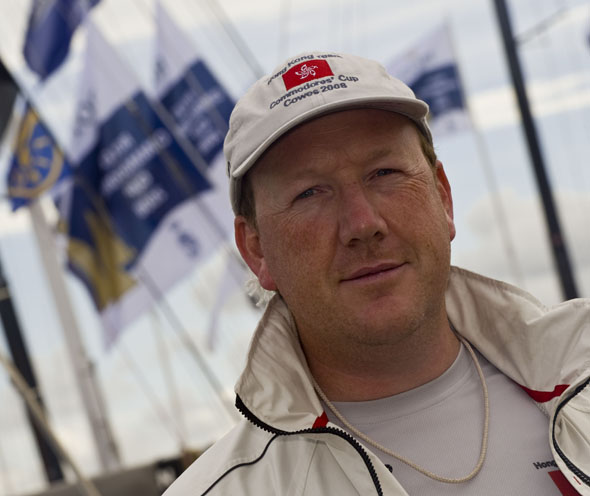
McWilliam (pictured above) is not just to participate, mind you, but to have a crack at winning. "In 2008 we arrived with a crew that had trained hard but which had never seen the boats before the regatta, as they were either charters or brand new. This meant that we spent quite a bit of important time just before the event working on the boats instead of working on our speed, and as a result we were still learning about the boats during the series. Our team this time was determined to avoid that mistake," comments McWilliam, explaining that this time, "all the boats are owned by Hong Kong owners and we therefore have much more time [to prepare]. Our full team will be at the UK IRC Nationals in late June and we are scheduling other weekends over the summer for the boats to have new sail trials."
It is a tall order to travel almost halfway around the world to participate in a three-boat team event. The three yachts needed to compete range in size, roughly, between 35 and 45 feet. There are crews to be identified, accommodation and travel to be arranged. McWilliam is clear that it is worth the effort, "it's always exciting going to an event where you think you have a chance to win but where you know you're going to have to really perform to achieve that. It provides a great combination of expectation, anticipation, and nerves. Combined with the knowledge that we are representing the small sailing community in Hong Kong, it's a really exciting deal."
McWilliam acknowledges the difficulties involved for foreign teams, particularly getting the right boats in the right condition to the venue when they are located more than a delivery trip away. He clearly believes more countries should look more seriously at the possibilities, "I would definitely encourage other teams to participate. The Solent puts unique and intense pressure on crews and seemingly trivial moments turn out to be really critical, like a down tide bottom mark rounding where you've got to be perfect in order to hold your lane to get out of the current. I also believe that the best team here has always won the event, and that's the best recommendation I know for a regatta."
The Hong Kong team is looking forward to renewing rivalries with some of the teams it competed against in 2008. They are not here to make up the numbers, "we really enjoyed the event in 2008 and feel that the event is a good match for the type of sailing we do in Hong Kong, and therefore represents a great opportunity for Hong Kong to compete against peers and find out where we rank. We were happy with our 5th position in 2008 but saw it very much as an initial effort and unfinished business."
The Rolex Commodores' Cup is a weeklong series mixing inshore racing on the waters in and around The Solent, the body of water separating the Isle of Wight from the mainland United Kingdom, with an offshore course that takes the fleet out into The English Channel and a course round the Isle of Wight. All of the racing is typified by one thing. Comprehensive knowledge of the tides and currents affecting these areas is essential. Furthermore, it has been proved time and again that is not just the team with the best boats or the best sailors that wins. It the team that is the best prepared in all aspects.
The Rolex Commodores' Cup will be held off Cowes, Isle of Wight, from 15 to 21 August. Entries, which must be made by Member National Authorities, close on Monday 12 July.
Entries go to the Wire for ICRA feeder
RCYC has issued a last reminder for anyone still wishing to take part in the feeder race from Cork to Dun Laoghaire on Friday. ICRA members will be interested to know that this promises to be a challenging and exciting race and will feature three Irish Commodore's Cup yachts from the Royal Cork Yacht Club, Anthony O'Leary in his Ker 39 Antix, Dave Dwyer in his Mills 39 Marinerscove.ie and Andrew Creighton in the new Corby 36 Roxy 6. This will be Roxy's first competitive outing and there will be much interest in this latest addition to the fleet. Entry for this race is mandatory for any boat wishing to compete in the Commodore's Cup.
Entry for the new Dublin-Cork race, which acts as a feeder race to this year's Liebherr Cruiser Nationals, stays open until 90 minutes before the start tomorrow at the Royal Cork Club Race Office. It is not known yet which boats will sail and which will travel by road. What can be confirmed is Donal O'Leary of RCYC will be sailing his well known D-tox and Schull Harbour Commodore,
Morgan O'Sullivan in Loco, will be using the feeder as a qualifier for his entry to the Round Ireland Race in June.
First gun will be at 19.55 hrs at Weavers Point on Friday and the start line will be a laid line between a committee boat (Adrielle) and an adjacent mark in the harbour. The finish line will be between the lighthouses on the East and West Piers at the entrance to Dun Laoghaire Harbour. Yachts will record their own finish times together with the names and approximate times of boats immediately ahead and astern, if possible. Time limit for the race will be 12.00 hrs on Sunday, May 16th.
Commodore's Cup Team Join ICRA Feeder
The waiting is over for ICRA members writes Claire Bateman and this is the last sailing reminder for anyone still wishing to take part in the feeder race from Cork to Dun Laoghaire on Friday next. This promises to be a challenging and exciting race and will feature three Irish Commodores’ Cup yachts from the Royal Cork Yacht Club, Anthony O'Leary in his Ker 39 Antix, Dave Dwyer in his Mills 39 Marinerscove.ie and Andrew Creighton in Roxy 6, the new Corby 36. This will be Roxy's first competitive outing and there will be much interest in this latest addition to the fleet. Entry for this race is mandatory for any boat wishing to compete in the Commodores' Cup.
As entry for the feeder race does not close until 18.30hrs. on Friday, 14th May at the Royal Cork Club Race Office, it is not known yet which boats will sail and which will travel by road. What can be confirmed is Donal O'Leary of RCYC will be sailing his well known D-tox and Schull Harbour Commodore, Morgan O'Donovan in Loco will be using the feeder as a qualifier for his entry to the Round Ireland Race in June.
First gun will be at 19.55 hrs at Weavers Point on Friday and the start line will be a laid line between a committee boat (Adrielle) and an adjacent mark in the harbour. The finish line will be between the lighthouses on the East and West Piers at the entrance to Dun Laoghaire Harbour. Yachts will record their own finish times together with the names and approximate times of boats immediately ahead and astern, if possible. Time limit for the race will be 12.00 hrs on Sunday, May 16th.
Welcome Roxy 6 to the Royal Cork Yacht Club
The Davies/Creighton Corby 36 has made a very welcome appearance on the marina at the Royal Cork Yacht Club writes Claire Bateman. She was recently completed at the Dale-Nelson Yard in Wales. She is built of strip cedar and is a close clone of Quokka 7.
Roxy 6 is expected to sail for an Irish team from Royal Cork Yacht Club. She will be the Class Three representative in the biennial Rolex Commodores’ Cup, an intense seven day racing programme that will take place on the testing waters in and around the Solent from August 15th to 21st, 2010. Class Two will be represented by David Dwyer’s Marinerscove.ie, recent winner of Class Zero at the Kinsale Spring Series. Class One is to be represented by Anthony O’Leary, now the new owner of Antix, a boat he chartered from Colm Barrington in 2008 that was the top scoring boat in its class at the 2008 Commodores’ Cup event.
The Class Bands are as follows:
Class One 1.110 to 1.230
Class Two 1.075 to 1.119
Class Three 1.025 to 1.074
Ireland is entitled to send up to four teams of three boats but currently there is no word of any other team emerging.
The programme for the team is as follows: They will compete in the feeder race from the Royal Cork on May 14th to the Liebherr ICRA Nationals that will take place in Dun Laoghaire from May 21st to 23rd. Antix and Roxy 6 will compete at the Scottish Series from May 28th to 31st. Marinerscove.ie will not compete at this event. The full team will regroup for the British IRC National Championships at Cowes from June 25th to 27th at which event Dave Dwyer in Marinerscove.ie will defend his title. This Championship is mandatory for the British Commodores’ Cup teams to compete in. After this its back to Royal Cork for Cork Week from July 10th to 16th. It is hoped the French and British teams will also compete at Cork Week. Finally they will head for the big one, the Commodores’ Cup in August, an event that we have just missed out on for the last two occasions and have some unfinished business we hopefully can settle this time round.
New Trophy for Offshore Race from Cork to Dublin
A new sailing trophy will be awarded to the winning yacht in a new offshore race from Cork Harbour to Dublin as part of the build up to the Irish Cruiser Racer Nationals to be held on Dublin Bay from May 21-23.
The feeder Race will take place from Royal Cork in Crosshaven on Friday 14th May. Commodore's Cup team boats will use the passage as part of their offshore practice.The Race also can be used as a qualifier for next month's Round Ireland Race and it will also accomodate double handed entries.
111 boats have already entered the Liebherr Nationals from 21st to 23rd May in the Royal St George Yacht Club in Dun Laoghaire. Event organisation is in full swing to ensure a quality event both aflaot and ashore, says ICRA Commodore Barry Rose.
Entry forms and sailing Instructions will be available at the Royal Cork Yacht Club. Interested boats are requested to inform ICRA of their intention to compete. The ICRA perpetual offshore trophy will presented to the winning yacht.
ICRA Entry Approaches 100
ICRA are reporting its national sailing championships entry is approaching the 100-mark nearly two months out from the event, the first big regatta of the sailing season.
The Liebherr Cruiser Nationals to be held in Dun Laoghaire from May from May 21st to 23rd and hosted by the Royal St. George Yacht Club, has already attracted very strong support. ICRA are delighted to report that already entries are almost at the 100 mark and expected to reach record numbers despite the current economic environment. The formula for the event will be a three-day championship with seven races.
There will be a variety of tight Windward/Leeward and Olympic type round the cans courses in two separate specially designated areas. The combination of the National Championships title at stake and an excellent social programme ashore has proved to be a great success. The fact that the event rotates locations has also added to its stature.
With the excellent racing and onshore entertainment planned by the Host Club, the Royal St. George, and in conjunction with the strong sponsors, Liebherr, The Royal Marine Hotel, Dun Laoghaire and Dubarry Footwear and Clothing, a very special festival of sailing plus a strong welcome for all competitors is assured. The inaugural ICRA Corinthian Cup for non-spinnaker boats is also being well supported with 17 entries already recorded. This event will be sailed on a separate course. Early entry is encouraged so that final Class Bands can be fairly decided.
Irish Cruiser Racing Association
![]()
ICRA National Championships in full swing
The Irish Cruiser Racing Association’s National Cruiser Championships
is now just a week away and for the first time ever it’s being hosted
on the West Coast by Tralee Bay SC – a club well used to giving a warm welcome to sailors: they’ve hosted events on all levels from Club to World Championships on this beautiful idyllic part of our coast.
Over 70 boats will contest the right to become the Irish National
Cruiser Champion in each of the divisions and the spoils will be Irish
Sailing Association Medallions and a place at the ISA Helmsman's
Championships at the end of the season for their achievement.
Last years Division Zero winner Dave Dwyer's
Marinerscove.ie is presently preparing on the Solent for the UK IRC
Nationals (6–7 June), but Dave’s commitment to defend his closely-won
title at last years National Cruiser Championships in Howth has put his
crew on a tight schedule to get the boat back in time for the first gun
in Tralee. Eamon Rohan (King 40 Blonde IV) will be Marinerscove.ie’s
main competition, finishing a very creditable 3rd at last year’s event.
Other strong competition in this division will come from Kieran
Twomey’s Corby 38 Gloves Off, Tim Costello’s Mills 43 Tiamat, George
Sisk’s Farr 42 WOW, under the burgee of the Royal Irish YC and the host
club giving him an advantage over the rest of the fleet outside of Rob
Allen’s Corby 36 Mustang Sally from the Royal Western YC.
In Division One Mike McCarthy’s Ker 32 Checkmate will be one to watch
but in this division there are plenty of diverse competitive boats:
Barry Cunningham’s Corby 33 Contango; two J109 – S. and J. Tyrrell’s
Aquelina and Pat Kelly’s Storm; Anthony O’Leary from the Royal Cork has
entered a modified 1720 Antix Beag; Denis Hewit is bringing his Mills
30 Raptor from the Royal Irish; and some local boats – Martin Reilly’s
Corby 29 Esperanto, Eddie Barry’s 40.7 Caolila and Dan Counihan’s First
36.7 Galileo. X-Yachts are out in force in this division: X332s include
Ian Gaughan’s Xena, Thomas and Kieran Whelan’s Chaos, Team Foynes’
Dexterity, and host club boat Donal Brown’s Excuse Me; X362s have David
Scott’s Eos, Derry Good’s Exhale, and Donal O’Leary’s X35.
Attracting the greatest number of entries is Division Two and the hot
favorite must be Colwell/Murphy’s Corby 25 Kinetic from Howth Yacht
Club, winner of this division last year – that’s not to say that they
will get it all their own way, one of the boats that will be trying to
take their title away is current West Coast Champion Conor Ronan’s
Corby 26 Ruthless; then Corby 25s – Vincent O’Shea’s Yanks &
ffrancs, Denis Coleman’s Thunderbird, and Denis Ellis’s Corby 27
Kodachi; also Sigma’s 33s – Commodore of the host club Liam Lynch’s
Powder Monkey, Peader O’ Laughlin‘s Reconaissance, David Buckley’s
Boojum, Finbarr O’Connell’s Treyona, and finally Dehler 34s – Raymond
McGibney’s Disaray, David Griffin’s Egalite, and Derrick Dillon’s Big
Deal to mention a few.
Division Three is as competitive as ever with Vincent Gaffney’s Albin
Express Alliance topping the bill, being a past Division Champion and
current West Coast Champion from Howth Yacht Club, but with plenty of
competition to make this division very competitive indeed – Paul
McGibney’s J24 Virgin will have his first outing at National level, but
as we saw at last year’s event the J24s were the ones to beat. Three
HB31s are also in this division – John Buckley’s Headhunter, Gary
Fort’s K Vector, Mark Prendeville’s Rooster, two Shamrocks – C.
MacDonncha’s Sliver Foam from Galway and J.P. Buckley’s Battle, Jackie
Ward’s Parker 27 Hallmark, and D. Losty’s very successful Quarter
Tonner Woody to name but a few.
Race Officers Alan Crosibe, Rob Lamb and Liam Dinneen with their
formidable teams will ensure competitors’ exhilarating sailing over a
variety of courses over the three days racing.
ICRA National Cruiser Championships, Tralee Bay Sailing Club 11 –13 June 2009
Fintan Cairns, Commodore – 087 24 9208, email: [email protected]
Denis Kiely, Secretary, 087 908 6424, email: [email protected]
Irish Cruiser Racing Association
Afloat posts for ICRA:



























